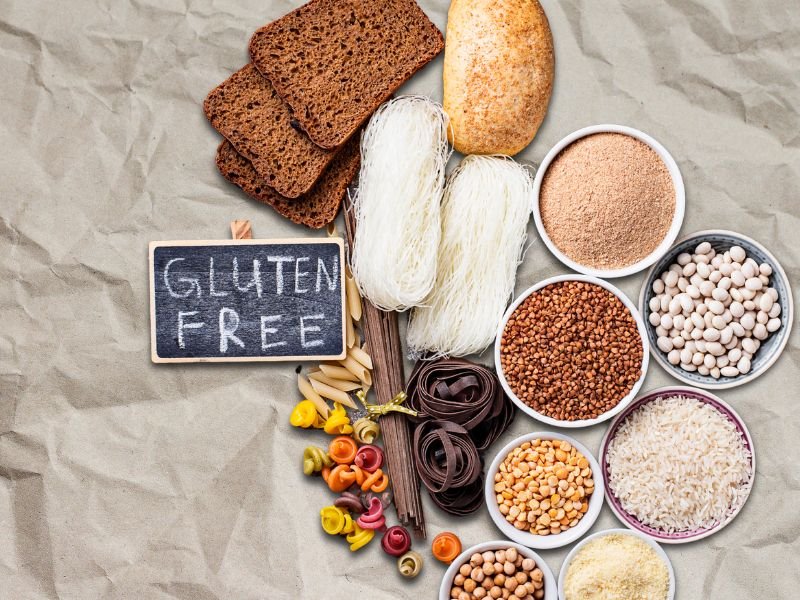What is Gluten Inflammation?
Gluten inflammation occurs when the immune system reacts negatively to gluten, a protein found in wheat, barley, and rye. For individuals with celiac disease, gluten sensitivity, or wheat allergies, consuming gluten can trigger an inflammatory response in the body. This inflammation often begins in the gut, leading to digestive discomfort and other systemic symptoms.
Understanding gluten inflammation is key to managing its effects. Whether it’s caused by an autoimmune condition like celiac disease or non-celiac gluten sensitivity, addressing inflammation can significantly improve overall health and quality of life. To explore more about the foundational aspects of celiac disease and gluten’s role, visit Celiac Disease Basics.
The Role of Gluten in Triggering Inflammation
Gluten can act as a trigger for inflammation, particularly in individuals predisposed to immune responses. Here’s how it works:
- In Celiac Disease:
When someone with celiac disease consumes gluten, their immune system mistakenly identifies it as harmful. This leads to an autoimmune reaction, damaging the small intestine and causing chronic inflammation. - In Non-Celiac Gluten Sensitivity:
Though the immune response in gluten sensitivity is less severe than in celiac disease, gluten can still irritate the gut lining and trigger symptoms like bloating, fatigue, and brain fog.
This inflammatory response doesn’t just affect digestion; it can also have systemic effects, influencing skin, joints, and even mental health.
Symptoms of Gluten Inflammation

Gluten inflammation manifests differently in each individual, depending on their sensitivity level and immune system. Common symptoms include:
- Digestive Symptoms: Bloating, diarrhea, abdominal pain, and constipation.
- Skin Issues: Rashes, eczema, or dermatitis herpetiformis, which is closely linked to celiac disease.
- Joint and Muscle Pain: Chronic inflammation can lead to discomfort in joints and muscles, mimicking conditions like arthritis.
- Fatigue and Brain Fog: Persistent tiredness and difficulty concentrating are common non-digestive symptoms of gluten inflammation.
Recognizing these symptoms early and addressing them through dietary changes can help reduce inflammation and improve overall well-being.
How Gluten Inflammation Affects the Gut
The gut is the primary site affected by gluten inflammation, especially in individuals with celiac disease or gluten sensitivity. When gluten is consumed, it triggers an immune response that can damage the lining of the small intestine, leading to several issues:
- Damaged Villi: In celiac disease, gluten inflammation flattens the villi, the tiny finger-like structures in the small intestine responsible for nutrient absorption. This damage reduces the body’s ability to absorb essential nutrients, causing malnutrition.
- Leaky Gut Syndrome: Inflammation weakens the intestinal barrier, allowing harmful substances to enter the bloodstream. This condition, commonly known as leaky gut, can exacerbate systemic inflammation.
Maintaining gut health is crucial for managing gluten inflammation. Learn more about testing for celiac disease and understanding its impact on the gut by visiting Celiac Disease Blood Tests.
Non-Digestive Effects of Gluten Inflammation
Gluten inflammation doesn’t just affect the gut; it can also have widespread effects on the body, impacting skin, joints, and mental health. Here’s how:
- Skin Conditions: Chronic inflammation can lead to conditions like dermatitis herpetiformis, a blistering rash associated with celiac disease.
- Joint Pain and Stiffness: Gluten inflammation can mimic autoimmune conditions like arthritis, causing persistent joint and muscle discomfort.
- Neurological Symptoms: Brain fog, headaches, and even anxiety or depression may result from systemic inflammation caused by gluten.
These non-digestive effects often make gluten inflammation harder to diagnose. To better understand the connection between gluten and autoimmune responses, check out Understanding the Celiac Gene.
Celiac Disease and Gluten Inflammation
Celiac disease is the most well-known condition linked to gluten inflammation. It is an autoimmune disorder in which consuming gluten leads to severe inflammation and damage in the small intestine. Key points include:
- Chronic Inflammation: Even small amounts of gluten can trigger long-lasting inflammation in individuals with celiac disease, leading to symptoms like bloating, diarrhea, and fatigue.
- Long-Term Effects: Untreated celiac disease can result in malnutrition, osteoporosis, and an increased risk of other autoimmune diseases.
For those with celiac disease, strict adherence to a gluten-free diet is the only effective treatment to reduce inflammation and promote healing. Learn more about diagnostic procedures in Genetic Testing for Celiac Disease.
Non-Celiac Gluten Sensitivity: Inflammation Without Autoimmune Response
Non-celiac gluten sensitivity (NCGS) is a condition where individuals experience symptoms similar to celiac disease without the autoimmune damage or antibodies associated with it. Gluten inflammation in NCGS presents as:
- Digestive Symptoms: Bloating, abdominal pain, and irregular bowel movements.
- Systemic Effects: Fatigue, brain fog, and joint pain.
- No Intestinal Damage: Unlike celiac disease, NCGS does not cause villous atrophy or detectable damage to the small intestine.
NCGS is often diagnosed by ruling out celiac disease and wheat allergies. Although the exact mechanism is not fully understood, managing symptoms through a gluten-free diet can significantly reduce inflammation and improve well-being.
Foods That May Aggravate Gluten Inflammation
Certain foods containing gluten or similar proteins can exacerbate inflammation, especially for those with celiac disease or gluten sensitivity. Common culprits include:
- Wheat-Based Products: Bread, pasta, crackers, and baked goods made from wheat flour.
- Barley and Rye: Found in beer, cereals, and certain processed foods.
- Hidden Sources of Gluten: Soy sauce, salad dressings, processed meats, and snack foods often contain gluten as a thickener or flavor enhancer.
Cross-reactive foods like oats (unless certified gluten-free) may also contribute to inflammation in sensitive individuals. For those managing gluten inflammation, identifying and avoiding these foods is essential.
Managing Gluten Inflammation Through Diet

Dietary changes are the cornerstone of managing gluten inflammation. A gluten-free diet helps reduce inflammation and allows the body to heal. Key strategies include:
- Eliminating Gluten: Avoid foods made from wheat, barley, and rye, and check labels for hidden gluten.
- Incorporating Anti-Inflammatory Foods: Include turmeric, ginger, leafy greens, and fatty fish, which can help reduce overall inflammation.
- Consulting a Dietitian: Work with a healthcare professional to ensure nutritional needs are met while following a gluten-free diet.
These dietary adjustments not only alleviate symptoms but also promote long-term health and prevent complications associated with gluten inflammation.
Lifestyle Changes to Combat Gluten Inflammation
In addition to dietary adjustments, adopting a healthy lifestyle can help manage gluten inflammation effectively. These changes support the body’s healing process and reduce overall inflammation:
- Stress Management: Chronic stress can exacerbate inflammation. Practices like yoga, meditation, and deep breathing exercises can promote relaxation and reduce stress-related symptoms.
- Regular Exercise: Moderate, low-impact activities such as walking, swimming, or cycling can boost circulation and reduce inflammation. Avoid strenuous exercise during symptom flare-ups.
- Prioritizing Sleep: Poor sleep can increase inflammatory markers. Aim for 7-9 hours of quality sleep each night to support recovery and overall health.
Combining these lifestyle changes with a gluten-free diet creates a holistic approach to managing gluten inflammation.
Can Gluten-Free Products Help Reduce Inflammation?
Switching to gluten-free products is essential for individuals with celiac disease or gluten sensitivity, but their impact on inflammation depends on their nutritional quality:
- Positive Impact: Certified gluten-free products eliminate the immune-triggering protein, helping to reduce inflammation and prevent symptoms.
- Nutritional Considerations: Some gluten-free products are processed and may lack fiber and essential nutrients, potentially leading to other health issues.
- Whole Foods Focus: Prioritize naturally gluten-free whole foods like fruits, vegetables, lean proteins, and gluten-free grains (e.g., quinoa, rice) for optimal health benefits.
Choosing high-quality gluten-free products and balancing them with whole foods can significantly reduce inflammation and improve overall well-being.
Conclusion: Understanding and Managing Gluten Inflammation
Gluten inflammation can have a profound impact on the body, especially for individuals with celiac disease or gluten sensitivity. By understanding its causes and symptoms, those affected can take proactive steps to manage inflammation and improve their health.
Key strategies include adopting a gluten-free diet, incorporating anti-inflammatory foods, making lifestyle changes, and consulting healthcare professionals for personalized guidance. Recognizing and addressing gluten inflammation empowers individuals to lead healthier, more comfortable lives.
FAQs for the Blog
- What is gluten inflammation?
Gluten inflammation occurs when the immune system reacts to gluten, leading to inflammation in the gut or other parts of the body. - What are the symptoms of gluten inflammation?
Symptoms include bloating, diarrhea, joint pain, fatigue, skin rashes, and brain fog. - Does gluten always cause inflammation?
Gluten primarily causes inflammation in individuals with celiac disease, gluten sensitivity, or wheat allergies. - How can I manage gluten inflammation?
Adopting a gluten-free diet and incorporating anti-inflammatory foods can help reduce symptoms. - Can non-celiac individuals experience gluten inflammation?
Yes, people with non-celiac gluten sensitivity may also experience inflammation and related symptoms.

